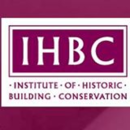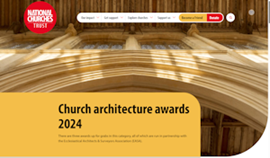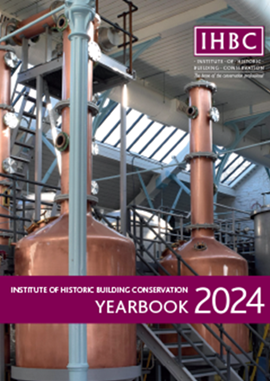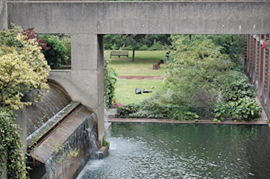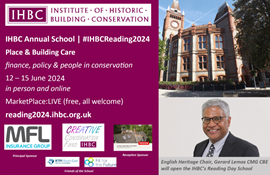Charging for Listed Building Consent pre-application advice part 2
This is part 2 of Charging for Listed Building Consent pre-application advice.
It was created by The Institute of Historic Building Conservation (IHBC). It was written by Bob Kindred MBE BA IHBC MRTPI IHBC and first published in Jan 2015. You can see the original on the IHBC website.
A confusing picture of fee setting
Some councils set fees for meetings but no fees for site visits (or vice versa). Some councils set different fees for domestic and non-domestic advice. Some do not tier their fees, i.e. written advice and meetings cost the same irrespective of whether the enquirer is a developer or an householder. This likely result of this is to discourage individual householders from seeking advice, particularly if also faced with the cost of preparing plans etc by an agent.
Although the general experience of users may be confined the fee structures of a single authority or several authorities in close proximity, the national picture overall is one of bewilderingly diversity and in some cases charges are ambiguously structured, obscurely or arbitrarily defined or seemingly unduly complex to administer.
What pre-application fees might be expected to cover
Fees published on a local authority’s website should enable users to readily understand precisely what service is on offer, the likely weight that can be attached to it and have a reasonable expectation of the overall cost.
In many cases, even when charges are categorized according to the type or size of the proposal it is by no means obvious if will define the expertise the authority will deploy; whether, for example, the officer[s] engaged in the process will have any specialist knowledge; or whether the status of the advice will be authoritative (ie will be likely to be accepted or over-ruled at formal submission stage). Over 86% of local authorities that charge a fee make no reference to the skills they will employ when offering LBC pre-application advice.
Based on the review of local authority web-content for this Research Note this is unlikely that these criteria can be easily met in which case users of the service are likely, at the very least, to have to make a clarifying telephone call or send an e-mail in order to understand scope of the charges and the expertise to be deployed by the council.
This is not to state that there are no exemplars, and number of local authorities have commendably clear and easily navigable websites including for example, Cornwall among unitary authorities; Harrow, Hillingdon, Richmond on Thames and Wandsworth among the London Boroughs; and Guildford, Southampton, Sevenoaks, and Stratford-on-Avon among the shire districts.
Blind testing of web content
The many evident infelicities within the local planning authority web pages accessed for the purposes of this Note suggests that council would be well advised to periodically ‘blind-test’ their web content by one or more external non-expert users to eliminate such shortcomings. Some sites, for example, refer to charges for statutory consents that have been abolished and in other instances cite enhanced charges relating to ‘complex’ listed building issues without ever defining what such complexity comprises.
Who provided fee-earning pre-application advice?
Surprisingly only four authorities (3.5%) make it explicit on their web pages that the fee for LBC pre-application advice provides for the availability of a conservation specialist: Barnet LBC; Bath & North East Somerset C; Tower Hamlet LBC and Wakefield MDC. Barnet implies that initial advice will only be provided by a Planning Officer, as an additional fee will be payable for subsequent advice from a Conservation & Design Officer.
Eleven authorities (9.7%) refer to LBC pre-application advice led by either the Planning Officer (unless this is an implicit catch-all title) - including Hammersmith & Fulham LBC; Kensington & Chelsea LBC; and Maldon DC; or by the ‘case officer’ – including Bury MBC and Three Rivers DC.
York CC is the only authority states that an additional fee is required in ‘exceptional circumstances where the development proposed is significantly complex and would require the input of a specialist officer’.
Both Tower Hamlets LBC and Bath and North East Somerset C imply the pre-application fee covers both a Planning Officer and a Conservation Officer but without defining if this is where both will attend a meeting or is an either/or situation. At Watford BC, there is no charge for initial (written) advice but a charge for meetings is made and the cost doubles if the Conservation Officer attends.
Bradford MBC makes it clear that the LBC pre-application fee includes the time of any specialist officer. Several of other authorities ambiguously refer to an additional fee if a ‘specialist’ is required, usually implied to be for conservation or landscape advice, although notably this does not seem to imply advice on archaeology. Maidstone BC quotes an additional fee being payable ‘per advisor’; Rother DC ‘per officer’.
Twelve authorities (10.6%) quote a charging figure for LBC pre-application advice without clearly specifying the nature of the service provided: Boston BC; East Lindsey DC; Hillingdon LBC; Liverpool CC; North Kesteven DC; Slough BC; South Kesteven DC; Stevenage BC; Warrington BC; Waveney DC; Waverley DC and Wellingborough BC. Although four of these authorities are in Lincolnshire, there is no other discernible pattern regarding the size, type or nature of the authorities; although in relation to numbers of list entries Slough BC and Stevenage BC each has just over one hundred listed building; while the remainder have an average of about 1,190.
On the evidence of web contact as the first point of contact for many generally enquiries, users are likely to be left with the distinct impression that the expertise the authority will make available for pre-application heritage matters will be development management rather than heritage management led. Furthermore a number of fee schedules refer to meetings and written responses being only at the discretion of the planning/case officer concerned, for example at Peterborough CC and Thanet DC.
Although this Research Note is concerned with LBC pre-application fees, many proposals are linked with a requirement to seek planning permission for which there is a more universal charging regime. It is not evident that any the fees generated specifically by LBC pre-application advice are distinguished from planning pre-application advice charges to directly support wider conservation services (or a separate cost centre). Fees on linked applications are not hypothecated to support heritage management functions even when schemes form part of an integrated development management process.
Only very rarely does a pre-application charging schedule specifically identify an additional fee for the attendance of a conservation specialist but the destination of that income is not explained. This appears to run contrary to the original objectives advanced by local authorities when introducing charges this this would fund improvements to the service and help offset the costs associated with, for example, conservation and/or design review panels.
Informal advice and reputational risks
Under some circumstances there are professional operational and reputational risks in cases where planning case officers are pressurised to give informal views in order to circumvent a fee, where conservation considerations are in play but without there being the benefit of a specialist conservation input. This should be avoided as the consequence could be to:
- undermine the specialist officer’s professional advisory role;
- expose the inadequacy of that advice where the relative significance of the building had already been evaluated in, for example, a heritage statement;
- expose the authority to reputational damage;
- especially if due weight is not given to the specialist advice. This could expose the authority to Judicial Review or an Ombudsman’s complaint. [12]
Charging structures
As referred to in fees for LBC pre-application advice are generally structured to provide for:
- A written response (sometimes simply referred to as ‘a letter’);
- An office meeting with one (or more) officer[s] (usually with a confirmatory response);
- A site meeting (sometimes with a confirmatory advice).
Published fees are not necessarily structured in this order, and as noted above, not all authorities appear to offer all three forms of pre-application advice. Fees will sometimes be provided only for a written response; sometimes for an office meeting only and not a site meeting (or vice versa) and may be entirely at the planning or case officer’s discretion.
Although it is the practice of some council officers to offer written informal advice without making a site visit but this is not good practice unless the issues are quite clear and notwithstanding the time and cost of travel where sites may be remote. There is an ever present risk that the owner or agent may complain that the (inevitably more generic) advice given is inadequate and lacks sufficient detail. The quality of professional officer advice offered will inevitably be tempered by the information received and it may be better to offer a more formal (even if circumscribed) opinion but conduct a site visit as an essential part of the delivery process.
In some authorities officers may have the discretion (or it may be formal policy) that a lower fee than the average is charged for a service which, because of the nature of the building or the proposals could involve a disproportionate amount of officer time.
In some cases a low fee may reflect a small number of listed buildings within the authority’s area and the likelihood of a low volume of requests for LBC pre-application advice; in other authorities where the numbers of listed buildings run into several thousand, the fees may also be low. Blackpool BC with 41 listing entries charges £24 for written advice and £48 if a meeting or site visit is included, whereas Colchester BC with 1,563 list entries charges £26 for written advice and £50 if a site visit is included.
Officer time
While demands on officer time can occasionally be anticipated, in many instances the amount of time required to provide a polite, prompt but unrushed professional service by telephone, e-mail or letter will not be reflected in the authority’s charging regime.
Where such multi-faced advice is common-practice and when there are a large number of listed building entries, authorities have usually thought it prudent to charge only for a first meeting of site visit, but with further requests for advice only incurring an additional charge if a further site visit is needed or a requirement for significant further research is revealed.
Rural authorities with a large geographical area and potentially long round trips (and travel costs) to sites have generally found this more satisfactory and needing and appropriate degree of discretion by the case officer although the experience and expertise and seniority of the decision maker may also be a factor.
The vast majority of local authorities (83.2%) do not set time limit on LBC pre-application discussions. Of the remainder all but three authorities set a one hour limit for meetings, usually held at council offices (but this timescale may equally apply to site visits) with any additional or follow-up meeting charged per hour. Cotswold DC applies a 2 hour limit for meetings while Hart DC charges per half-hour and Watford for thirty or forty-five minute meetings.
Charging per hour
Only two authorities, Bath & North East Somerset C and Melton DC charge a fixed fee per hour for all aspects of LBC pre-application advice, but Melton DC sets a two-hour limit for this. Only five authorities (4.4%) charge an hourly rate for meetings and only six authorities charge an hourly rate for separate further discussions.
Other variations of charging structure
While a recognizable and logical pattern to charging is based on a calculation of officer time for meetings and/or associated written confirmation, there are other variations from this simple easily understood and administered formula.
Complex applications
Five of the outer London Boroughs: Barnet; Enfield; Haringey; Merton and Richmond; define their charges for LBC pre-application advice principally in terms of complexity. Barnet differentiates ‘complex heritage issues’ from ‘complex listed building and conservation area issues’ as separate charging categories without clearly defining either - but levies a fee of £824.50 for the former but only £273 for the latter. Richmond similarly varies its charges of £1,861 for complex schemes and £852 for minor schemes. No provision appears to be made in these other London Boroughs if the pre-application advice is specifically not complex.
Two Devon authorities, South Hams DC and West Devon DC have very similar advisory structures and an identical fee to the effect that charge is levied ‘where significant advice, redesign and site visits are needed’ but the advice is free ‘where little guidance is needed’ although the boundaries between these two categories is not defined.
Cotswold DC imply that some pre-application advice might involve complexity by reference to fees related to ‘substantial specialist conservation advice’, and Wealdon DC notes that ‘more complex proposals will attract a higher fee’. None of the authorities attempt to define this complexity within their web content or, for example, what the scope of a desk-top study might comprise. York is the only authority that makes reference to ‘external input’.
Householders
As domestic dwellings form by far the largest category of listed buildings it is axiomatic that most pre-application requests originate with householders, but they are also generally one-off applicants. It should normally be possible to deal with these enquiries promptly because they are usually simple in scope. There will be instances where advice and/or clarification will be sought on other matters, particularly on site; request further advice or to gain a better understanding of the relative, or overall significance of the building.
The more usual charging method of a fixed fee rather than an hourly rate and experienced practitioners find this tends to encourage longer discussions with home-owners and agents anxious to get the maximum value from the fee. This happens less when an hourly rate is charged but it often helps concentrate minds on the essential and relevant issues.
Although many local authorities bracket LBC pre-application advice fees with minor planning alterations etc the practice of grouping domestic listed building work with householder proposals is variable. Braintree DC, Bury MBC: Gateshead MBC; Guildford BC, Kettering BC, Maidstone BC and Uttlesford DC make a simple distinction between householder and non-householder schemes and this is usually accompanied by a sharp differentiation in the fees. For example, Maidstone charges £440 for a one hour meeting but this falls to £86 for advice on householder proposals.
Islington differentiates between householder proposals and those that are ‘not a single dwelling house or residential flat’; Wandswoth LBC offers a lower charge for written advice to householders, while Hackney LBC only charges a fee for householder LBC pre-application advice. Lambeth LBC bases its charges on domestic dwellings and the ‘cost is based on the time required to consider a proposal affecting a typical listed building within Lambeth – a C19 terraced house or individual house within a larger block’.
It is quite possible that a number of other authorities automatically include LBC Pre-application fees for domestic dwellings in the same category as ordinary householder applications, but if this is the case, the web content does not make this explicit.
In principle advice & fast track advice
Mid Devon DC and North Devon DC charge a low preliminary fee for in-principle written advice and Rochford DC for ‘generic’ written advice, while South Oxfordshire DC and Vale of White Horse DC have separate sets of fees regarding pre-application advice on heritage issues and specific advice on listed building extensions. Aylesbury Vale DC has a sliding scale of charges depending on the speed of response required, while Bedford BC provides a lower fee for fast-track written advice.
Wyre Forest DC is unique in charging per issue. The authority charges £37 for raising ‘up to three separate matters’ and £72 for ‘more than three separate matters’ but does not explain wow these matters are compartmentalized.
Fees based on floorspace
Although stratification of planning fees for different ranges of (commercial) floorspace is commonplace, this is not usually apply to LBC pre-application advice. Wandsworth LBC sets a fee for LBC pre-application advice of £150 where alterations to the floorspace of a listed building will increase by up to 999 sq.m but no fee is quoted if the increase exceeds this figure. Westminster CC charges for written advice on listed building alterations where the increase in floorspace is less than 499 sq.m, although again no fee is quoted if the increase exceeds this figure.
Wokingham DC’s web content defines its fees according to charges related to increases in non-householder floorspace up to 2,999 sq.m and between 3,000 and 5,000 sq.m (with a separate fee for householder schemes).
Charging by building type
The web content of local authorities does not structure its LBC pre-application fees in accordance with specific building types despite the possibility that in some locations for example barns in rural authorities conversion schemes may be quite prolific. The omission of building types might also be a consequence of the very intermitted updating of fee schedules.
Several county conservation forums have drawn attention to the often time- consuming nature of barn conversion proposals. It is felt that these almost invariably require a site visit but assessment is often hampered by a lack of informed prior recording and less than best practice descriptions on the National Heritage List. It is persuasively argued that the introduction of a building-specific fee for buildings such as these could enable the principle of conversion, alteration and repair to be addressed especially if the appropriate documentation necessary to support such an application were clearly specified.
Charging by type of authority
111. There is no clearly discernible pattern to this among types of authority with one notable exception. None of the national park authorities charge for LBC pre-application advice apart from Dartmoor NPA which only charges a fee for a site visit (and a follow-up if necessary).
Miscellaneous issues
Co-ordinated charges
Local or sub-regional groups of local authorities are known to occasionally compare their pre-application fees. Work was done by Kent Conservation Officers Forum in 2014 to compare three Kent districts with thirteen other widely spread English local planning authorities. [13] Similar work may have been done elsewhere but if so it, does not appear to readily accessible.
Any widespread agreement to co-ordinate fees cannot be confirmed but it is noted that several pairs of authorities in Devon do so, as do authorities in central Lincolnshire, but even where this occurs, there does not appear to be any overt common policy or specific objectives for the use of the income generated other than perhaps the offering of a greater degree of local clarity for users about the costs of the service offered.
A note about joint site visits with Building Control Officers
LBC pre-application discussions may raise questions regarding implications for building regulations. Under those circumstances it may be advisable for a joint site visit with Building Control Officers but no fee structures exist specifically for this eventuality.
Planning submissions rarely contain the detail necessary for Building regulations approval and resolution of some issues at LBC pre-application advice stage may obviate the need for detailed post planning approval amendments that often only become apparent after a listed building consent has been issued.
Local authority Building Control services do not currently charge for pre-application advice (even though larger projects might include heritage component) as generally the service would want some sort of assurance that they would be used for the formal application. An additional fee payable to the local authority would be difficult to justify especially where Building Control is in competition with Approved Inspectors. [14]
This is one of a series of occasional Research Notes published by The Institute of Historic Building Conservation (IHBC). The Notes necessarily reflect knowledge and practice at the time they were developed. IHBC always welcomes new case examples, feedback and comment to ihbc.org.uk research@ihbc.org.uk.
--Institute of Historic Building Conservation
Related articles on Designing Buildings Wiki
- Appeals against urgent works notices.
- Building Preservation Notice.
- Cautions or formal warnings in relation to potential listed building offences in England and Wales.
- Certificate of immunity.
- Charging for Listed Building Consent pre-application advice.
- Conservation area.
- Conservation officer.
- Designated areas.
- Ecclesiastical exemption.
- Enterprise and Regulatory Reform Act 2013 and listed buildings.
- Forced entry to listed buildings.
- Heritage partnership agreement.
- Historic England.
- Institute of Historic Building Conservation.
- Killian Pretty Review.
- Listed building.
- Listed Building Heritage Partnership Agreements.
- Local Listed Building Consent Orders.
- Listed Building Consent Order.
- Negotiating skills for conservation professionals.
- Planning authority duty to provide specialist conservation advice.
- Pre-application advice for planning permission.
- Use of direct action in heritage enforcement cases in England.
External references
- [1] In practice the number of individual listed buildings may exceed the number of list entries by up to 40%.
- [2] ie beyond development management, not covering other key service components: policy advice; technical advice; conservation area appraisal and management; grant administration; heritage at risk; quality assurance, compliance and enforcement; and, environmental enhancement.
- [3] A Material World - Charging for Pre-Application Planning Advice’, PAS April 2007
- [4] in some authorities this extended to listed buildings and works in conservation areas
- [5] No specific work appears to have been done by any of these bodies since 2003 on the heritage management regime and the planning arrangements are far from consistent.
- [6] a practice which is still far from evident from most local authority planning web content.
- [7] The method of validation of listed building applications is an important consideration for good practice. Conservation specialists should normally play a significant part in validation given the consultation role of, for example, the statutory consultees and should not be seen as just an administrative exercise.
- [8] When Dover DC introduced charging in July 2009 an immediate drop in enquiries resulted to an average level of one pre-application consultation per month. [Source: unpublished Kent Conservation Officers Group Paper 2014]
- [9] although some authorities charge for this
- [10] Usually triggered directly by the Parochial Church Council and the Incumbent or via the Diocesan Advisory Committee
- [11] For the sake of comparison, any schedules of fees on the relevant Council webpage that were quoted exclusive of VAT, have for the purposes of this this Research Note been converted to include VAT for easer of comparison. (The tax is payable in any event, of course).
- [12] See IHBC website www.ihbc.org.uk for Ombudsman cases, and particularly the Judicial Review July 2014, High Court, Queen’s Bench Div. Steve Pendleton v Stratford on Avon DC ex parte Charles Davies.
- [13] Unpublished report 2014.
- [14] Although in some areas the Building Regulations are administered by Approved Inspectors they also don’t currently charge but again they would want an assurance they were getting the business.
IHBC NewsBlog
Church architecture awards 2024: now open
The National Churches Trust has announced three awards, all of which are run in partnership with the Ecclesiastical Architects & Surveyors Association (EASA).
The essential sector guide includes officers' updates and a foreword by EH Chair Gerard Lemos.
Historic England opens nominations for the National Blue Plaque Scheme
The scheme is open to nominations to celebrate people from all walks of life.
Striking photos show nature reclaiming brutalist concrete
‘Brutalist Plants’ explores nature’s links to the architectural style characterised by imposing form and exposed concrete.
Purcell’s guidance on RAAC for Listed Buildings in England & Wales
The guidance specifically focuses on Reinforced Autoclaved Aerated Concrete (RAAC) in listed buildings.
IHBC Membership Journal Context - Latest Issue on 'Hadrian's Wall' Published
The issue includes takes on the wall 'end-to-end' including 'the man who saved it'.
Heritage Building Retrofit Toolkit developed by City of London and Purcell
The toolkit is designed to provide clear and actionable guidance for owners, occupiers and caretakers of historic and listed buildings.
70 countries sign Declaration de Chaillot at Buildings & Climate Global Forum
The declaration is a foundational document enabling progress towards a ‘rapid, fair, and effective transition of the buildings sector’
Bookings open for IHBC Annual School 12-15 June 2024
Theme: Place and Building Care - Finance, Policy and People in Conservation Practice
Rare Sliding Canal Bridge in the UK gets a Major Update
A moveable rail bridge over the Stainforth and Keadby Canal in the Midlands in England has been completely overhauled.






